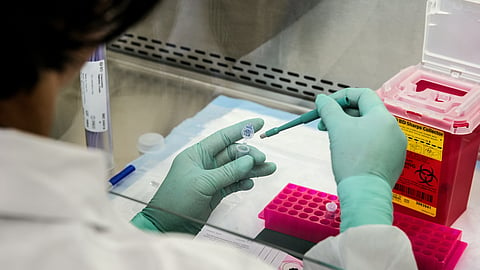

In a development that could accelerate the discovery of new diagnostics and treatments, researchers at Children’s Hospital of Philadelphia (CHOP) have developed a versatile and low-cost technology for targeted sequencing of full-length RNA molecules.
The technology, called TEQUILA-seq, is highly cost-effective compared to commercially available solutions for targeted RNA sequencing and can be adapted for different research and clinical purposes. The details were described in a paper in Nature Communications.
On the journey from gene to protein, an RNA molecule can be cut and joined in different ways before being translated into a protein. This process is known as alternative splicing, and it allows a single gene to encode several different proteins.
Although alternative splicing occurs in many biological processes, it can be dysregulated in diseases like cancer, leading to pathogenic RNA molecules. To understand how alternative splicing might lead to disease, researchers need to have accurate accounting of all the RNA molecules (known as “transcript isoforms”) that emanate from a single gene.
One way of doing so is using “long-read” RNA sequencing platforms, which sequence RNA molecules over 10,000 bases in length end-to-end, capturing the entirety of the transcript isoforms.
However, these long-read platforms have modest sequencing yield, which has hampered their widespread adoption, especially in the clinical setting, as generating long-read RNA sequencing data at clinically informative depth could be prohibitively expensive.
Targeted sequencing, which involves enriching specific nucleic acid sequences of interest prior to sequencing, is a useful strategy that can substantially enhance coverage of predefined targets, but the cost and complexity of target capture have been barriers to wider use.
One method that allows for targeted sequencing is called hybridization capture-based enrichment, which uses short pieces of nucleic acids called oligonucleotides as capture probes. These oligonucleotides (often simply referred to as “oligos”) are tagged with biotin molecules and designed to hybridize to their targets based on nucleic acid sequence complementarity, which allows for easy capture and isolation of their target sequences from a biological sample.
However, although hybridization capture-based enrichment is an efficient method for targeted sequencing, commercially synthesized biotinylated capture probes are expensive and can only be used for a limited number of reactions, making the per-sample cost high for each capture reaction.
To address this limitation, the CHOP researchers developed TEQUILA-seq (Transcript Enrichment and Quantification Utilizing Isothermally Linear-Amplified probes in conjunction with long-read sequencing). A key innovation in TEQUILA-seq is a nicking-endonuclease triggered isothermal strand displacement amplification reaction, which can synthesize large quantities of biotinylated capture probes from a cheap pool of non-biotinylated oligos as the templates.
Using an input of only 2 ng of template oligos, the researchers can generate 25 ug of TEQUILA probes, which can be used for at least 250 capture reactions. This innovative strategy for synthesizing capture probes makes TEQUILA-seq highly cost-effective and scalable for large target panels and many biological samples.
To benchmark its performance, the researchers performed TEQUILA-seq for multiple gene panels on synthetic RNAs or human RNAs. TEQUILA probes performed as well as commercial capture probes in target capture and enrichment, while being hundreds of times cheaper for each capture reaction. Moreover, the researchers demonstrated that TEQUILA-seq can substantially enhance detection while preserving quantification of target RNA molecules.
To illustrate its biomedical utility, the researchers applied TEQUILA-seq to profile full-length RNA molecules of 468 actionable cancer genes across 40 breast cancer cell lines.
They discovered previously unknown transcript isoforms in extensively studied cancer genes that may shed light on how genes that protect the body from cancer are inactivated in individual tumors.
(IB/Newswise)
